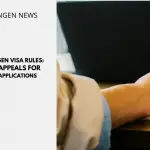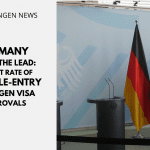How to Apply for a Germany Schengen Visa for UK Residents
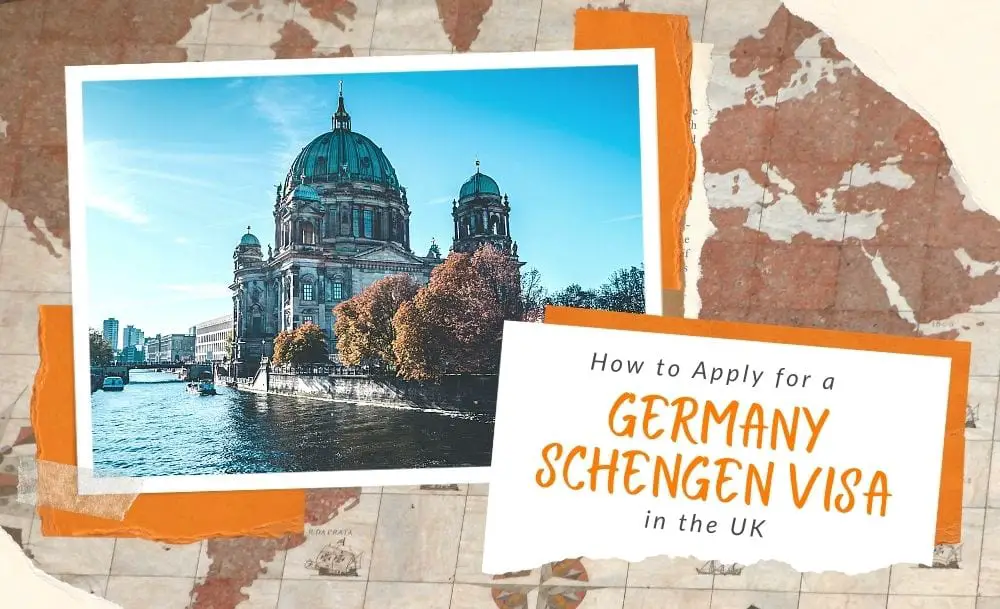 [su_spoiler title=”Contents In this Article” icon=”plus-circle”]
[su_spoiler title=”Contents In this Article” icon=”plus-circle”]
- Germany Entry Restrictions in Response to Coronavirus
- Who Can Apply for a Germany Visa from the UK?
- Easy Steps to Apply for German Visa Schengen Visa from the UK
- Schengen Visa Extension
- Germany Schengen Visa Frequently Asked Questions
History, culture, and natural beauty perhaps best describe the essence of touring Germany. The Old Town Hall in Bamberg, the Schwerin Castle, Nuremberg Christmas Market, Octoberfest, Cologne Cathedral, the corrugated, dune-fringed coasts of the north; the moody forests, romantic river valleys, and vast vineyards of the center; and the off-the-charts splendor of the Alps, carved into rugged glory by glaciers and the elements. All of these are integral parts of a magical natural matrix that have resulted to be very alluring for travellers around the world.
As a destination, it offers a clutch of truly lovely cities, culture served up in hefty portions, and rural scenery so pretty that the country attracted 459.6 million visitors to the Federal Republic of Germany in 2017 alone.

However, getting into Germany is not an easy piece of cake for everyone, since a Schengen visa for Germany is required for many. Despite the fact that Germany has reached visa facilitation agreements with many countries, there are still many more around the world, the citizens of which need to obtain a visa, even for short-stays and tourism.
If you are planning to visit Germany, for a period shorter than three months for either visiting family members or friends, or sightseeing, then you may need a Schengen visa, which not only allows you to visit Germany but also to travel across other Schengen member states enlisted in the Schengen Zone as well as other countries.
Germany Entry Restrictions in Response to Coronavirus
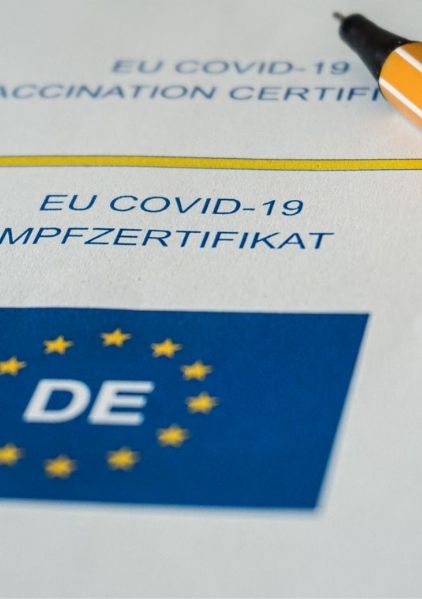
In early 2020, Germany was among one of the Schengen countries that closed its borders in response to the COVID-19 pandemic. Germany has since re-opened its borders back up for travel, but with restrictions that depend on your country of origin. Germany, like most other Schengen countries, updates its restrictions regularly depending on the current situation.
You should check on the latest news regarding restrictions, quarantine or whether a test will be required either from reliable news sources, the German government website, or the UK government website one to two weeks before your trip to be aware of the latest requirements for travelling to Germany.
EU Digital COVID Certificate
The EU Digital COVID Certificate was available starting 1 July 2021, provides proof that a person has either:
- been vaccinated against COVID-19
- received a negative test result, PCR or rapid antigen,
- or has recovered from COVID-19
The EU Digital COVID Certificate grants travellers the same rights as vaccinated, tested or recovered citizens of the EU Member State they are visiting and allows travel into the EU
Germany started issuing EU Digital COVID Certificates on 1 July 2021. EU citizens and residents can have their Digital COVID Certificates issued and verified across the EU. You can find out about how Germany is handling their EUDCC on their website.
Related articles:
- ETIAS – European Travel Information and Authorization System
- EU Settlement Scheme for Non-EU/EEA Family Members
- Brexit Reminder: Things that will change in 2021
Who Can Apply for a Germany Visa from the UK?
Travelling to Germany for EU/EEA Citizens
Germany is a Schengen country, which allows for free movement between the 26 EU and EFTA states (Iceland, Norway, Liechtenstein, and Switzerland). A uniform Schengen visa issued by one of the Schengen states is valid for travel within the whole Schengen area.
Travelling to Germany Post Brexit for UK Citizens
The rules for travelling or working in European countries changed on 1 January 2021:
- you can travel to countries in the Schengen area for up to 90 days in any 180-day period without a visa as a tourist, to visit family or friends, to attend business meetings, cultural or sports events, or for short-term studies or training
- if you are travelling to Germany and other Schengen countries without a visa, make sure your whole visit is within the 90-day limit. Visits to Schengen countries within the previous 180 days before you travel count towards your 90 days
- for long-stay visits, to work or study, for business or for other reasons, you will need to meet the German government’s entry requirements.
- if you stay in Germany with a residence permit or long-stay visa, this does not count towards your 90-day visa-free limit
- show a return or onward ticket
- show you have enough money for your stay
If you were living in Germany before 1 January 2021, you should carry your residence document (Aufenthaltsdokument-GB), as well as your valid passport when you travel. If you have applied but not yet received your document, carry your certificate of application (Fiktionsbescheinigung).
If you have not yet applied for a residence document GB, you should carry credible evidence that you are resident in Germany. This could include an address registration certificate (Meldebestätigung), tenancy agreement, or a utility bill in your name, dating from 2020.
If you cannot show that you are resident in Germany, you may be asked additional questions at the border to enter the Schengen area, and your passport may be stamped.
You should also check your passport's validity when you travel and renew it if you don't have enough time on it. Your passport must be:- valid for at least 3 months after the day you plan to leave Germany, or any other Schengen country
- less than 10 years old
Travelling to Germany Post Brexit for UK Citizens
Citizens of the following countries residing in the UK and planning to visit Germany are required to get a German visa in order to be able to enter Germany.
[su_tabs][su_tab title=”A-C”][su_table]| Afghanistan | Algeria | Angola |
| Armenia | Azerbaijan | Bahrain |
| Bangladesh | Belarus | Belize |
| Benin | Bhutan | Bolivia |
| Botswana | Burkina Faso | Burma/Myanmar |
| Burundi | Cambodia | Cameroon |
| Cape Verde | Central African Republic | Chad |
| China | Comoros | Congo |
| Cote D'iviore | Cuba |
| Dem. Rep. Of Congo | Djibouti | Dominican Republic |
| Ecuador | Egypt | Equatorial Guinea |
| Eritrea | Ethiopia | Fiji |
| Gabon | Gambia | Ghana |
| Guinea | Guinea-Bissau | Guyana |
| Haiti | India | Indonesia |
| Iran | Iraq |
| Jamaica | Jordan | Kazakhstan |
| Kenya | Kosova | Kuwait |
| Kyrgyzstan | Laos | Lebanon |
| Lesotho | Liberia | Libya |
| Madagascar | Malawi | Maldives |
| Mali | Mauritania | Mongolia |
| Morocco | Mozambique | Namibia |
| Nepal | Niger | Nigeria |
| North Korea | Northern Mariana's | Oman |
| Pakistan | Papua New Guinea | Philippines |
| Qatar | Russia | Rwanda |
| Sao Tome And Principe | Saudi Arabia | Senegal |
| Sierra Leone | Somalia | South Africa |
| Sri Lanka | Sudan | Suriname |
| Swaziland | Syria | Tajikistan |
| Tanzania | Thailand | Timor-Leste |
| Togo | Tonga | Tunisia |
| Turkey | Turkmenistan | Uganda |
| Uzbekistan |
| Vietnam | Yemen | Zambia |
| Zimbabwe |
The main requirement if you want to apply from the UK is that you must have a UK residence permit valid for at least another three more months beyond the date you plan to leave Germany or the Schengen Area.
Before starting a visa application, or getting a flight to Germany, make sure to check whether you need a visa to Germany or not.
If you have a 3-month UK visa you can extend it for three more months in order to be eligible to apply for a German Schengen visa from within the UK. You must apply for an extension before your visa expires and while you’re still in the UK.
You should apply for a visa at the German Consulate General in the UK if:
- You are only visiting Germany in the Schengen area – This means that if you want to visit Germany only, you will not be allowed to apply for a visa for Germany. You must plan to visit Germany in order to qualify for the visa.
- You will spend most of your visiting days in Germany – If you are doing a tour around Europe and the Schengen zone countries, you will have to apply for the visa in the country you will be staying the longest. So, if you want to visit Germany for 5 days, Belgium for 4 days, and the Netherlands for 3 days, you are eligible to apply for the visa in Germany. If you are staying longer in another country, then you cannot apply for a visa in Germany.
- It is the first country you plan on visiting – If you have the previously mentioned tour of Germany, Belgium, and the Netherlands, you can apply for the Germany visa only if Germany is the first country you will visit from your tour. You will need to first enter the country from which you have obtained your visa in order to be allowed to visit others in the Schengen area.
Please note that if you are not a resident in the United Kingdom you should apply at the German Embassy/Consulate or German visa application centre in your country of residence.
Easy Steps to Apply for German Visa Schengen Visa from the UK
Step 1: Identify visa type and validity
To apply for a Schengen visa to Germany in the UK, you first need to know the type of visa you require and how long the visa will be valid. There are different German Schengen visa types depending on your purpose of travelling from the UK to Germany.
- Short-stay (Schengen) Visa – valid for up to 90 days (in a 180-day period) for the purposes of tourism, business, visiting family/friends, conference, EEA/EU national family member
- Residence and work permits (Long stays) – you should apply for this kind of visa if you want to live in Germany for more than 90 days for employment, family reunification, study, research etc.
You will then be issued either a single entry, double-entry, or multiple-entry visa for up to 5 years based on the information you provide in your visa application.
It is important to choose the correct Schengen visa type to apply for depending on your trip so that you have the best chance of having your application approved. Find out more about the different types of Schengen visas in our blog post: Schengen Visa Types – All You Should Know When Applying for a Schengen Visa.
Step 2: Identify Where to Make Application
Where should you apply for a German Visa in the UK?
Within the United Kingdom, there are several centres where you can submit your application. The two main ones are the Germany Visa Application Centers in London and Manchester. For residents of Scotland, you might need to apply through the Consulate General in Edinburgh.
How to choose where to apply in the UK?
If you reside in England or Wales then you should apply at the German Embassy London.
If you reside in Scotland or Northern Ireland then you should apply at the German Consulate General in Edinburgh.
All visa applications for Germany are processed by the Embassy of Germany in London, and they also make the decision whether you will be granted entry into Germany or not. If you are applying for the first time, you will need to go to the Visa Application Center operated by VFS in the UK.
VFS is the official processing company authorized by the German Embassy for this purpose. You need to physically hand in your visa application in person at this centre in order for it to be accepted and processed.
When you go to submit the application, the attending staff will take your biometric information, including ten fingerprints and your photograph. Once this information is entered into VFS’s system called Visa Information System or VIS, it will be stored there. You can use this stored information for any visa application within the Schengen Zone for the next five years.
When to apply for a Schengen Visa to Germany?
The earliest you can file your Schengen visa application is at most six months before your intended trip towards Germany. Whereas, the latest you can do so, is two weeks prior to your trip to Germany.
However, you are highly recommended to apply for a tourist visa at least three weeks before your travel date in order to avoid any processing delays.
Step 3: Book an appointment at the consular office
To apply for a Germany visa you must book an appointment with the German Embassy in London or German Consulate General in Edinburgh.
This can be done in different ways:
- By booking an appointment directly at the German Embassy in London or German Consulate General in Edinburgh:
Embassy of the Federal Republic of Germany in London, England
Address: 23 Belgrave Square, Belgravia, London SW1X 8PZ, UK
Phone: +44 20 7824 1300
Fax: +44 20 7824 1435
Email: [email protected]
Opening times: Monday – Friday only by appointment
Consular district: Avon, Bedfordshire, Berkshire, Buckinghamshire, Cambridge shire, Cheshire, Clwyd, Cornwall, Derbyshire, Devon, Dyfed, Dorset, Essex, South Glamorgan, Mid Glamorgan, West Glamorgan, Gloucestershire, Greater Manchester, Gwent, Gwynedd, Hampshire, Hereford and Worcester, Hertfordshire, Humberside, Kent, Lancashire, Leicestershire, Lincolnshire, Greater London, Merseyside, Norfolk, Northamptonshire, Nottinghamshire, Oxfordshire, Powys, Salop, Somerset, Staffordshire, Suffolk, Surrey, East Sussex, West Sussex, North Yorkshire, West Yorkshire, South Yorkshire, Warwickshire, West Midlands, Isle of Wight, Wiltshire, Isle of Man and Northern Ireland, Channel Islands, Gibraltar, Falkland Islands (Malvinas).
Consulate of the Federal Republic of Germany in Edinburgh, Scotland
Address: 16 Eglinton Cres, Edinburgh EH12 5DG, UK
Phone: +44 131 337 2323
Fax: +44 131 346 1578
Email: [email protected]
Opening times: Monday to Friday: 9:00 – 11:30 am
Consular district: Scotland and the following counties in North England: Cumbria, Darlington, Durham, Hartlepool, Middlesbrough, Northumberland, Redcar and Cleveland, Stockton on Tees, Tyne and Wear (Tyneside), as well as North Yorkshire with the exception of Selby and York.
You can book an appointment every working day from 9 am to 10 am except on holidays. - Through VFS Centres in London and Manchester. German visa applications for UK residents are to be submitted at the Germany Visa Application Centres in London and Manchester. All applications will be assessed by The Embassy of Germany, London.
Step 4: Complete your application form
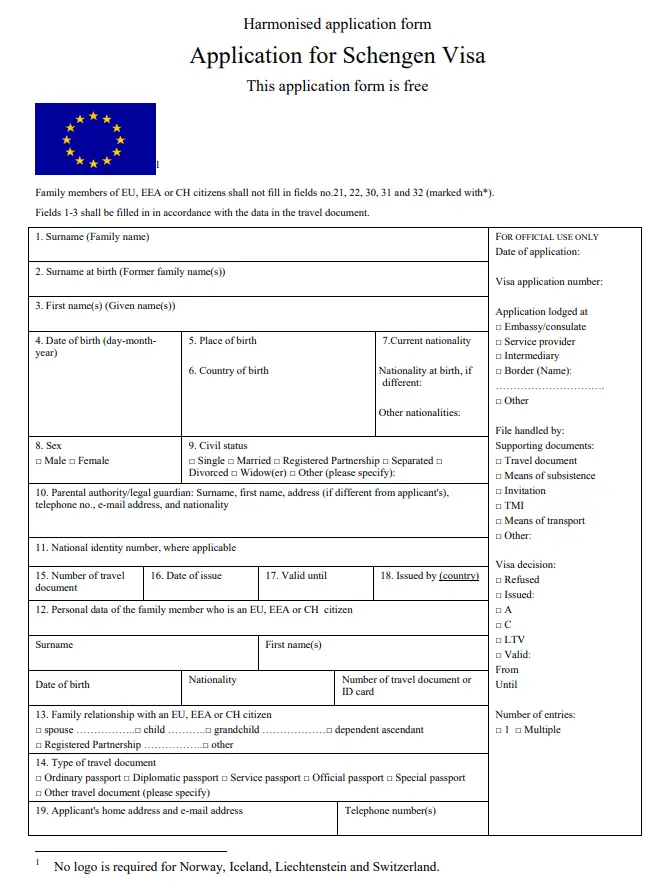
The Schengen Visa application form contains questions about you including:
- Name and surname
- Date and place of birth
- Nationality
- Sex and marital status
- National Identity number
- Passport number
- Home address and email
- Purpose of trip
- Question regarding previous trips to Schengen, if any
- Intended date of arrival in Schengen area you are visiting, and the intended period of stay
- Cost of traveling and remaining in Schengen area you are visiting, who will cover them, etc.
Make sure your answers are correct and that they comply with the information in the rest of the documents. Complete the form, print it twice, and sign both copies at the end.
Find out more about how to complete a Schengen visa application form in this blog post.
Step 5: Prepare your documents
The following documents are required for any short-term German visa application in the UK:
- Your passport with at least two blank pages, make sure that:
- Your passport has been issued (not extended) within the previous 10 years,
- Your passport has 2 full blank pages, one for the visa stamp and an additional spare page,
- Your passport will be valid for at least three (3) months after the date you exit the Schengen Area.
- A valid UK residence permit or another form of Identity Card. The UK residency permit must be endorsed in the actual passport (or on a new biometric ID card)
- German visa application form completed in English or German. The form should be fully, honestly, and correctly completed, printed, and signed at the end.
- Declaration of Accuracy of Information
- A Cover Letter. This personal cover letter should explain the reason why you wish to visit Germany, how long you intend to remain there, and what you will be doing there, amongst others.
- Proof of travel arrangements. Round trip flight/travel reservations from the UK to Germany and back to the UK, or other proof of intended transport and complete itinerary of your visit to Germany (if the several Schengen States will be visited or if the trip covers the several Schengen States and non-Schengen countries).
- Travel health insurance which covers at least 30,000 Euros and is valid for all Schengen countries
- Your residence address in the UK from a utility bill, bank statement, or another form
- Proof of accommodation in Germany:
- Evidence of a hotel booking in Germany or rental agreement, or
- Invitation from your German host (family member, friend) along with a copy of their passport or ID (Proof of sponsorship if dependent)
- Proof of financial means. You will need 45€ per day in Germany. This could be:
- A bank statement not older than three months or
- A letter of sponsorship from another person – Declaration of Commitment “Verpflichtungserklärungen”.
- Any previous passports or visas that you have had
The documents listed above are documents required in all cases, regardless of the purpose of your visit in Germany.
Depending on your employment status, here is a list of additional documents that are required for your Germany visa application in the UK:
For UK employees:
- Employment contract
- Current bank statement of the latest 6 months
- Leave permission from the employer
- Income Tax Return (ITR) form or Certificate of Income Tax deducted at the source of salary
For the self-employed:
- A copy of your business license
- Company bank statement of the latest 6 months
- Income Tax Return (ITR)
For foreign students in the UK:
- Proof of enrolment
- No-objection certificate from school or university in the UK
For retirees:
- Pension statement of the latest 6 months
If unemployed and married to an EU citizen:
- A recent (less than 3 months old) Confirmation of Employment letter from their spouse’s employer stating the position held within the company as well as the starting date,
- Spouse’s valid passport
- An officially translated marriage certificate. The translation must be in English or German and must be certified as a true copy by the Embassy of the country where the marriage took place or by the Legalization Bureau of the Foreign Office in UK
Requirements for children under the age of 18
Underage children must be accompanied by parents or an adult guardian at the application center at the German Embassy or Consulate-General. Also, minors who are granted a German visa are not allowed to travel to Germany by themselves. They should be accompanied by an adult during their stay in Germany.
Required documents for Germany visa application for underage children
- Original birth certificate among others.
- Signed travel consent from both parents
- If one parent is not located in the UK, they should submit their signed consent to the German Embassy/Consulate of their residing country
Note: All documents must be either in German or English or officially translated by a certified translator.
Step 6: Attend your appointment
The visa interview is a meeting between you and the consular officer/interviewer. During this interview, the consular officer will ask you several questions about you and your intended trip. You will also be submitting the required documents throughout the meeting, to the interviewer.
On the day of your appointment:
- Arrive at least 20 minutes early – if you are late and miss your appointment, you will have to make a new one
- Remember all your documents – check you have everything before you arrive at VFS Global. If you hand over an incomplete application, it could be rejected
- Give your appointment confirmation letter to security
- You will be given a number
- You will wait until your number is called

- When it’s your turn, the visa staff will examine your passport, visa application, and supporting documents
- Your biometric data will be captured (unless you have provided this data within the last 5 years)
- You will pay the visa fee and service charge
- You will be issued a receipt for the fees paid
- After the appointment, VFS will send your application to the embassy for processing. If the embassy needs any further information and/or they want any more documentation from you, you may have to attend an interview. During this interview, you may be asked questions about your application. If they do this, simply comply with their requests and answer any questions truthfully.
Typical questions include:
- Have you ever travelled to the EU before?
- Are you meeting anyone in Germany?
- What are you going to do in Germany?
- Can you show me your bank statements?
- How will you pay for your trip?
Don’t jeopardize your Schengen visa interview at the last minute. Use this comprehensive and thorough visa interview guide to crack the visa interview!
Germany Visa Fees for UK Residents
Since Germany is a Schengen state, visa fees are the same as any other Schengen visa.
The fee must be paid upon submitting the Germany visa application. After you complete this payment, you will receive a receipt, which shows that payment has been made, which must be offered amongst other documents of the application dossier. You will have to pay a Germany Schengen visa fee in order for your application to be processed. Find out about the Schengen visa fee in our blog post: Schengen Visa Fees – How Much Does a Schengen Visa Cost?
Germany Visa Fee Exemptions
The following persons are exempted from visa fees:
- Children younger than 6 years of age
- Family members of an EU/EEA national. You will need:
- Original Marriage Certificate, or
- Civil Partnership Certificate
- Original full Birth Certificate
- EU/EAA national’s passport.
- Persons travelling for the purpose of study or educational training and are accompanied by teaching staff such as school pupils and undergraduates and postgraduates. You will need:
- A letter from the school principal/dean that states that the trip is an obligatory part of the school/college programme.
Step 7: Receive your visa
Germany Visa Application Processing Time in UK
You can apply for a German Schengen visa up to 180 days before your planned trip. Usually, the German visa application process takes a minimum of 5 working days.
However, for nationals of the following countries the application time takes at least 14 working days (Source: VFSGlobal):
- Afghanistan
- Algeria
- Egypt
- Iran
- Iraq
- Jordan
- Kazakhstan*
- Kuwait
- Pakistan
- Lebanon
- Libya
- Mali
- Mauritania
- Morocco
- Niger
- Nigeria
- North Korea
- Oman
- Qatar
- Rwanda
- Saudi Arabia
- Somalia
- Sudan
- Syria
- Tajikistan*
- Tunisia
- Uzbekistan
- Vietnam
- Yemen
*Note: except for diplomatic and service passport
After a visa application decision has been made, you can pick up your documents from the Visa Application Centre or have your documents returned to you by courier for an additional fee. For some Visa Application Centres your documents will only be returned via courier.
Collecting your documents in person: bring the receipt issued by the Visa Application Centre and a form of Government identification. If permitted you may be able to send a representative to collect your documents; they will need to present a letter of authorization signed by you, bring the receipt issued to you by the Visa Application Centre and their Government identification.
Please check with the Visa Application Centre at time of your appointment for the options available to collect your documents.
Please note that the time for passport collection is from Sunday to Thursday between 10:00 am to 4:00 pm.
Visa application decision
There are two outcomes for your Germany Schengen visa application:
- Approved – Once your visa is approved, it will be stamped in your passport. Make sure to carefully check the visa sticker to make sure everything is correct and exactly how you need it.
- Rejected – if your visa has been rejected, it would have been for a specific reason, which will be stated on your rejection letter. You have the right to appeal.
Visa Application Rejection
There are a few common reasons why your visa application might be rejected. For example, if you provide illegitimate or insufficient documents, apply for the wrong type of visa, or fail your immigration interview.
If your visa application is rejected, you will not be refunded for your application. You will need to either appeal or file the application again. To avoid this hassle, make sure your documents are in order and you fill out the form correctly. With a service like IaM, we check your application before submission to ensure the highest possibility of having your visa application approved.
The latest data revealed that Germany is one of the Schengen members with the least visa rejections for 2022. The report also shows that German consulates and visa centres worldwide granted the most number of multiple-entry Schengen visa.
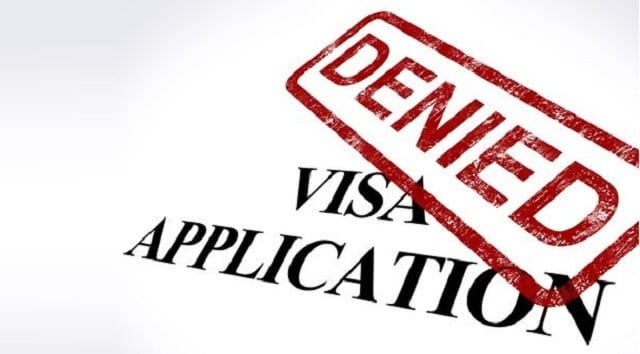
Common Germany Schengen Visa Rejection Reasons
- Marriage certificate missing – if you are applying for a visa for family reasons, you may have to prove family ties. This is why you must provide a marriage certificate
- You applied for the wrong visa – it is your responsibility to apply for the correct visa depending on how long you are going to Germany for and your reason for travelling there
- It is not clear that you plan to return to the UK – it must be clear that you intend to return to the UK before the visa expires. If the visa staff have doubts about this, your visa will be rejected
- Purpose of your trip cannot be established – the reason why you are planning to go to Germany must be made clear. You can do this by providing specific documents like a full itinerary, work contract or invitation letter etc.
What if My Germany Schengen Visa is Rejected?
If you receive a negative answer in your German Schengen visa application, this does not mean you cannot ever travel to Germany. In fact, you have two options.
- File an appeal for German Schengen visa rejection if you believe that the decision to deny you a visa is unjust. You should have a strong basis for your complaint. You can appeal this decision by writing an appeal letter for a Germany Schengen visa rejection.
- Reapply by correcting the mistakes you did in your previous application. Or improve your situation in order to comply with the eligibility criteria for a German Schengen Visa.
Germany Schengen Visa Extension
A person visiting Germany on a Schengen visa is allowed by law to extend their visa if they have legitimate reasons. This could be either personal, professional, medical, emergencies or any other. The decisions to approve a Schengen visa extension request are handled case by case.
The duration you are allowed to stay in the country is stated in your Schengen visa sticker. It is important not to overstay during your trip to Germany or the rest of the Schengen Zone or risk facing penalties like a fine, deportation, being banned from travelling back to the Schengen Zone, and having difficulties in your future Schengen applications.
There are also cases when people do not get any penalties for overstaying, for example a child or a person that cannot travel without a caretaker because of an illness or disability or an unforeseen event that prevents you from leaving the country, like COVID-19.
Find out more about overstaying in the Schengen visa in our blog post.
Germany Schengen Visa Extension Process
The overall process of extending your German Schengen visa will involve:
- Determining whether you have a justified reason to request for an extension
- Submitting all the necessary documents. These include a valid passport that has the Schengen Visa used to get in the Schengen area stamped in it, one passport-sized photo, proof of financial subsistence, Schengen Visa Insurance that covers the extension duration, and all the documents that justify your reason for an extension
- Paying visa fees where applicable
- Attending a visa interview if necessary
- Waiting for the approval
You must apply for a Schengen visa extension before it expires. It may take a few days to a month for the authorities to process your visa extension request, during which you are legally permitted to stay in the country where you applied for the Schengen Visa but cannot travel to other Schengen Countries.
If your visa extension request is approved, you can extend your stay in the Schengen Area until the visa validity.
If your visa extension application is rejected, you will have to leave the Schengen area in a day or two.

Germany Schengen Visa Frequently Asked Questions
Is a Germany Visa easy to get?
Yes! You can apply for the visa online or use immigration services like IAM to make the process even simpler for you and have a higher chance of your application being accepted.
How long does German Schengen visa take?
You can apply for a German Schengen visa up to 180 days before your planned trip.The German visa application process takes a minimum of 5 working days, but can take up to 2 weeks. We advise you to make your application 3 weeks before your trip to make up for any possible delays in processing.
How much is a Schengen visa for Germany?
The fee for a German Schengen visa is 80€ for adults, 40€ for children between 6-12 years of age, and free for children younger than 6 years of age. Keep in mind that these fees may change depending on currency fluctuations and can be paid only in UK Pounds. Payments can be made in cash and by credit or debit card.
How can I get German Schengen visa fast?
You can get a premium Schengen visa to get your German Schengen visa within 24 to 48 hours, which includes personalised advice from an expert immigration adviser.
How much money do I need to show in my bank account for a Germany Schengen visa?
According to the European Commission, you must be able to prove to the German Embassy or Consulate that you have 45€ per day for the duration of your stay in Germany.
What other countries can I travel to on a German Schengen visa?
You can travel to any of the 26 countries in the Schengen Area, as well as 18 other countries.
So, are you ready to make your Schengen visa application for Germany? Comment below.
IaM can help with your visa application to the United States, the UK & other countries
If you need help with a US visa, a UK Visa, or visa to Europe, including help with appointment booking obligations, IaM can help. For more information and advice on US immigration, UK immigration law and US visa applications or if you need any help or assistance please, reach out to your Visa Coordinator at IaM.
- How to Apply for a Luxembourg Schengen Visa from the UK - 14 March 2025
- How to Apply for a Liechtenstein Schengen Visa from the UK - 13 March 2025
- Austria Schengen Visa Requirements for UK Residents - 11 March 2025

